- Home
- Elmore Leonard
The Switch Page 11
The Switch Read online
Page 11
“You sure you don’t want me to drive you?”
He gave her a look: she was on dangerous ground again.
“That’s right, you want to have a car out there,” Mickey said. “And you’ll be back . . . Saturday?”
“I said Saturday or Sunday. But it might be next week, if I stop and see Bo on the way back. He’s gonna be gone a month.”
It was in her mind to say, Why? You hardly ever see him when you’re home. But Frank would come lashing back, or make it sound as though she was nagging him. Something was strange. This morning he’d said he was coming home Saturday, be gone a week. (Usually on his business trips to the Bahamas he was gone three or four days, at the most.) Now he was talking about staying, either in Freeport or Fort Lauderdale, until the following week. She tried to picture him, briefly, entertaining a busy, scurrying group of Japanese investors . . . then, standing in the sun, watching a bunch of kids at a tennis camp.
Mickey said, “I’d better call my mother, tell her you’re coming in later.”
“Why don’t you do that?” Frank said, the edge still there . . .
But gone without a trace only minutes later, mixing vodka and tonic at the kitchen counter, talking to Bo while Bo sat at the breakfast table with a bag of potato chips. “I’m sorry I didn’t catch your match,” the dad said. “That was a shame. I understand the guy wasn’t too aggressive.”
“Aggressive, he played like a girl.” Bo had sympathy and was pouting. “All he wanted to do was lob.”
Mickey listened.
“He didn’t have any backhand. He’d push at the ball, you know, like he was playing Ping-Pong, hit it up in the air with a little spin on it.”
And Bo would break his back trying to kill it. Mickey stacked the breakfast and supper dishes in the dishwasher but didn’t turn it on yet.
“The ball comes down, God, it’d hang there. You got so much time, you know, you want to kill it. What was I supposed to do, keep hitting lobs?”
Justifying, making excuses. He didn’t get that from his mother. But then she wasn’t sure.
Bo said, “If I played the way he wanted we would’ve looked like a couple of girls.”
“I know what you mean,” the dad said. “That’s why I don’t play mixed doubles anymore. It isn’t worth it.”
God help me, Mickey thought. She could beat Frank in straight sets and he knew it. But she didn’t say anything. After a moment she began to wonder. Maybe he didn’t know it.
The telephone rang while they were still in the kitchen. Frank, with a fresh drink and a plate of cheese and crackers, was sitting at the table with Bo. Mickey stepped over to the wall phone to answer.
Marshall Taylor’s voice said, “Hi. Is this the Coast Guard? I was wondering if the coast is clear?”
Mickey said, “What?” She took another moment and said, “Oh, he’s right here.”
She listened to Frank say, “No, partner, I told you this morning I’m gonna be away. You remember now? . . . That’s right. Yeah, Bo and I are leaving eleven oh five . . . You bet, partner. Shake it easy.”
Coming away from the phone Frank said, “I think Marsh’s getting hardening of the arteries.”
Leave by ten they’d have plenty of time to make the flight, Frank said. He preferred to race to the airport rather than wait around at the gate with the amateur travelers who checked in a half hour or more ahead of time.
When they had finally gone, Mickey sat down at the breakfast table with a cup of coffee and her grocery list note pad. She wrote at the top of the page:
EXCUSES—JUSTIFICATION
She was thinking of Bo. Maybe he did get it from her.
No. She didn’t make excuses. At least not out loud. She kept them to herself. What she did, when Frank annoyed her she would make harmless-sounding remarks she knew would irritate him—not often but often enough—then innocently cover up with, “All I said was—” She would jab lightly with the needle and then duck, instead of getting mad and letting him know how she felt.
Now then—In a stab at self-analysis she wrote:
Why don’t you ever speak up to Frank when he
(she almost wrote “pisses you off”)
does something you don’t like?
She began listing the reasons, adding her reactions to the reasons, her excuses, as she went along.
Because you shouldn’t get mad.
(Says the goody-goody)
If you raise your voice, Frank raises his louder.
(An assumption, you’ve never raised yours)
Frank won’t listen to you anyway. You’re only his wife.
(Poor me. Meant to be funny (?)
Frank isn’t aware enough to know there’s a problem, a personality conflict.
(How could he if you keep it a secret?)
The final reason drew no reaction. There was no excuse for the excuse and it remained simply:
No guts.
Marshall called back at 11:30, the house quiet, Mickey upstairs getting ready for bed. He said, “Now is the coast clear?” The jerk.
She tried to sound a little annoyed. Don’t call again, please. She had no intention of having lunch with him and that was that. Then said, “Let’s not do anything dumb, okay?” Including herself in the game so he wouldn’t be blamed entirely. Why couldn’t she simply tell him to bag his ass?
“We’ll talk about it. I mean we’ll talk about us tomorrow,” Marshall said. “I’ll pick you up about one o’clock.”
“I won’t be here.” Desperate. “I have to take my car in tomorrow.”
“What’s wrong with your car?”
“Oh—somebody ran into it.”
“Let Frank take care of it,” Marshall said. “Listen, the only time I can make it is around one. I’ll call you first, give you the exact time. See, then I’ll pull up in back, you run out and jump in. Right? Right. I’ll see you.” He hung up.
She wondered what it would be like if she did fool around a little, had an affair. Go to bed with someone else. If somehow it was all right.
Out of all the men at the club, which one would she pick?
Mickey thought about it, putting on her long pajama top, getting into bed, and reached a conclusion before turning out the light.
None of them.
At 3:30 the phone rang again. Mickey groped for it in the dark.
Her mother said, “Mickey?” making sure. Well, Bo arrived safely but hungry. She had given him a piece of homemade lemon pie and a glass of milk and finally marched him off to bed in the guest room that would be Bo’s room for the next month, with his own bathroom, his towels and washcloth laid out . . . and on and on and on, so Mickey was to relax and not worry about a thing. Mickey said that’s fine, Mom. She said, “Are dad and Frank still up?” Her mother said, Frank? They wanted him to come home with them and offered to drive him back, but Frank said it was too much trouble. He was on the 7 o’clock shuttle to Freeport and insisted on staying at the airport. Said we’d just get home and have to come back. After a moment, Mickey said, “Well, you know Frank—” Her mother said, Do I. Frank and your father, those two would be up all night talking business. She said well, that’s all she had to report. Mickey could sleep in peace now.
Mickey said, “Thanks, mom, g’night.” And lay awake for at least an hour.
8
* * *
ORDELL BROUGHT OUT HIS BOX OF HALLOWEEN MASKS, set it on the coffee table in front of Louis and said, “Now you know how long I’ve been working on this deal.”
They were in Ordell’s apartment, Louis stretched out in a La-Z-Boy recliner with the Magic Ottoman up. He’d been sitting here four days on and off, since Ordell had met him at Detroit Metro and told Louis he was coming home with him. Louis had said home where? Some place in Niggerville? Ordell said no, man, nice integrated neighborhood. Ofays, Arabs, Chaldeans, a few colored folks. Ethnic, man. Eyetalian grocery, Armenian party store, Lebanese restaurant, a Greek Coney Island Red Hot where the whores had their coffee, a bloc
k of Adult Entertainment, 24-hour dirty movies, a club that locked the doors and showed you some bottomless go-go and a park where you could play 18 holes of golf. Does it excite you?
“I used to live there,” Louis said. “Six Mile and Woodward.”
“Live there again till you rich,” Ordell said.
Louis had thought he should go to his sister’s in Allen Park and take his chances on whether he and her husband Chuck would be swinging at each other by the second day. But once he stepped into Ordell’s big four-bedroom apartment with a den, a dining room and a lady who came in to cook and clean anytime Ordell phoned her, well, this was the place.
Ordell had leased it a year ago when he was tight with a lady named Sandy and Sandy had invited two girlfriends to live with them who gave Ordell “rent money,” twenty per cent of what they made entertaining tricks, so it wasn’t like Ordell was pimping. They were cute ladies and the rent money they paid was usually twice as much as the $400 a month Ordell paid.
He liked it during the day, the cute ladies sitting around playing music, laughing at things he said. But he didn’t care for the white Johns any, their attitude. Mostly it was a businessman who’d bring a customer to have a party and try grass and cocaine for the first time. (The ladies usually kept a couple of grams in the refrigerator. Ordell said he would not tolerate any scag though. He told them if he saw any lady in a scag nod he’d throw her ass out the window.) So Ordell would have these businessmen stumbling around in their skivvies sneezing, spilling drinks, shit, middle-aged jitterbugs trying to dance salsa with the cute ladies who’d be giggling, having some fun with them. Ordell said he knocked that shit off after four months and Sandy left with her girlfriends.
Ordell said he saw the man right here the first time. The man had brought somebody worked for a bank and bought them a $200 evening, about four hours worth of bullshit and a half hour in the bed. Ordell had found out the man was a big condominium developer-builder in the suburbs and, Sandy said Gigi said, he was also a property owner downtown. Property owner meaning a slum landlord, Ordell had thought at first.
“But no. Property owner meaning Dynamic Realty, which is the same almost as Dynamic Improvement Company,” Ordell had said to Louis Sunday evening, driving home from the tour. “Now, you understand what I’m saying?” Louis had said, “Not all the way yet, but it’s coming together.”
So Louis had been sitting in the La-Z-Boy and getting up to eat, sitting there and getting up to go out and pick up a lady and get laid, twice—in between listening to Ordell tell him how they were going to make a million dollars and looking at the sights Ordell showed him. Louis did not get excited or ask many questions. He let Ordell make his presentation and dribble out things the way he wanted, taking his time. As Ordell said, “Be cool, Louis. You ain’t got to be anywhere but with me.” (For about six years, in high school and in the Navy and a little after that, Louis had been Lou; but Ordell always called him Louis. Ordell said, “Looo. That’s not a name, man, that’s a sound. Some places it’s a toilet.”)
Ordell and Louis had a good time looking at the masks.
Ordell had four Richard Nixon rubber faces; four because he originally believed it would require four people and he thought it would be funny if they were all Nixon and there was a witness wondering maybe if one of them was real. He and Louis put on Nixon faces for awhile and said, “Now I want to be perfectly clear on that,” and tried to drink beer through the faces. Louis said yes, it would be funny, but who was gonna laugh, the cops?
Ordell had some horror masks he liked: rubber faces of different monsters, green and gray ones with big bug eyes and snaggled teeth. He had a Frankenstein monster mask he said was for Richard Edgar Monk. He had a good vampire face Louis liked, but it was too hot after a couple of minutes. They were all too hot, Louis said. Ordell said, here’s a witch one. Here’s, hey, some funny cartoon characters, Mickey Mouse and Donald Duck and Goofy.
Louis said they were too hot, you couldn’t breathe in them. He said, “Don’t you have any, you know, those little black masks, they just cover your eyes?”
Yeah, he had them. “I was thinking about for the lady,” Ordell said, “ ‘stead of a blindfold, but we could wear ‘em too.”
Louis put on one of the small black masks and turned his head to look around, trying it out. Then Ordell put one on and they both began to grin. This was the mask they’d use—no question about it now—the kind you always saw on crooks in cartoons and old comic strips: the guy with a mask and a cap like Louis’ and a striped sweatshirt opening up the safe.
Ordell said he was also thinking—to wear instead of regular clothes?—these warm-up suits he saw at K-mart, fifteen bucks, blue with a yellow stripe down the pants. Louis stared at him and Ordell said, “No, huh?” Louis said no.
“Otherwise what do you think?” Ordell waited.
“Well,” Louis said. “I don’t see a schedule of events.”
“It’s loose, but it can go any time now. See, what we are, we’re flexible,” Ordell said.
Louis thought some more. “Where’d you say the bank is?”
“Freeport, Grand Bahama Island. Called the Providence Bank and Trust, in the Churchill Building.”
“How do you know that’s where his money is? Or it’s still there?”
“Because of my good friend Mr. Walker,” Ordell said, “who draws $300 a month from the account I opened when I went down. My friend Mr. Walker, a onetime bone-fisherman going big-time with a twenty-foot Boston Whaler and a ‘72 Vega imported from Miami. See, right away the gator in him come out and he began flashing. But it’s cool, because Mr. Walker is right next to Lisabeth Cooper who works at the Providence Bank and Trust and has the second biggest pair of titties in the Bahamas on ladies twenty-five or younger. She keep Mr. Walker informed.”
“Who has the biggest pair?” Louis said.
“Lady live out at Eight Mile Rock, also a close friend of his. Hey, you think the colud chicks here have high asses, wait, man.”
“You must’ve spent some time there, doing your homework.”
“I went there the first time—I never told you?—it was, must’ve been seven-eight years ago. That was when I first met Cedric Walker, the bone-fisherman. I had this idea how to take off this entire hotel, every room in about twenty-five minutes, but we never done it.”
“Why not?”
“I’ll tell you about it sometime. What else you feel about this one?”
“Well—” Louis had to think. “We tell the man to switch the money from his account payable to your account. Then he’s gonna know who you are, right?”
Ordell shook his head. “He only knows what my number is. They number accounts. We call the bank, find out it’s been deposited. Then we write a check, transfer the whole thing to another number account in Nassau.”
“We?” Louis said.
“That’s right. I got a form you’re gonna sign, make it a joint account.”
“How’d you learn all this banking stuff?”
“Talking to people, man. It ain’t hard. They understand you got money, you can do anything you want. Pay a little bit here and there, shit, it’s easy.”
“Okay,” Louis said, “the guy’s pulling about fifty grand a month out of Detroit, the apartments and whatnot, and banking it in the Bahamas for his retirement.”
“Not declaring it, paying any taxes, any of that shit,” Ordell said.
“Okay,” Louis said, “why isn’t that enough? Hold that over his head. He pays or you go to the Federal Building. I mean why do we have to complicate it with something they can call in the FBI for?”
“Because I know he’s doing it,” Ordell said, “but I can’t prove it in the Federal Building. You think the man’s dumb? I told you, there’s no papers with his name on it. Ray Shelby is the president of Dynamic and there’s nothing says the man is behind him and making all the money.”
“How come he trusts Ray Shelby?”
“I don’t know,” Ordell said. “
Maybe he’s got pictures of Ray doing it with a donkey. What I think is, the man pays him enough, that’s all. Ray’s got a good deal.”
“How come Ray tells you all this?”
“Ray doesn’t know he’s telling me. You squeeze out a little bit here and there and put it together. Peek in Ray’s office, that house-trailer, when he’s not there and look around. Ray was the man’s construction super before the man set him up downtown, doing the apartments.”
“Okay,” Louis said, “we send the guy a note, we call him or what?”
“We call him on the phone.”
“He’s not gonna like it.” That was a dumb thing to say, but Louis was trying to think of everything at once and he was starting to think out loud. He said, “She never sees us, who we are.”
“No, she don’t see us. She got the mask on with tape over the eyeholes.”
“How about—okay, let’s say he’s scared enough, he doesn’t see any choice. He doesn’t call the cops. He goes through with it, he pays.”
“Yeah? That’s the way it’s supposed to work.”
“What’s his wife gonna think? How come he didn’t call the cops, the FBI?”
Ordell frowned. “Because they get into it, it’s his ass. They want to know how come he’s got all that money in the Bahamas.”
“I mean what if she doesn’t know about it?” Louis said. “After, what does he tell her?”
“He tells her to hush her mouth.” Ordell still looked puzzled. “What difference it make what he tells her? If she don’t know, it’s his problem.”
“I mean after—what if she gets pissed off at him for not doing anything?”
The telephone rang. Louis glanced over at the desk sitting in the bay of windows.
Ordell got up, Halloween masks spilling from his lap. “Not doing anything? The man paid a million dollars to set her free, ain’t he?” He walked over and picked up the phone.
There was something that bothered Louis, but he couldn’t put his finger on it. He heard Ordell say, “Richard”—his voice bright and alive—“How you doing, man? . . . Yeah? . . . Yeah? You don’t tell me . . .”

 Charlie Martz and Other Stories: The Unpublished Stories
Charlie Martz and Other Stories: The Unpublished Stories Elmore Leonard's Western Roundup #2
Elmore Leonard's Western Roundup #2 Fire in the Hole
Fire in the Hole Tishomingo Blues (2002)
Tishomingo Blues (2002)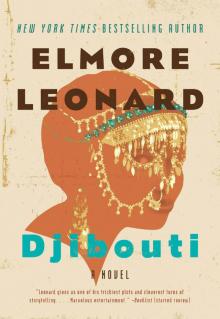 Djibouti
Djibouti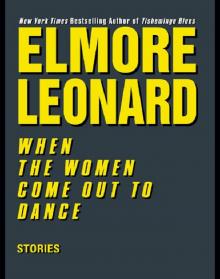 When the Women Come Out to Dance: Stories
When the Women Come Out to Dance: Stories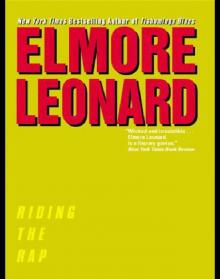 Riding the Rap
Riding the Rap Moment of Vengeance and Other Stories
Moment of Vengeance and Other Stories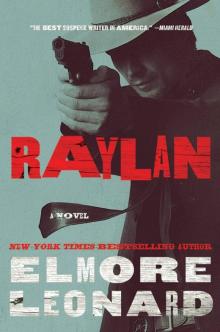 Raylan
Raylan Touch
Touch Mr Majestyk
Mr Majestyk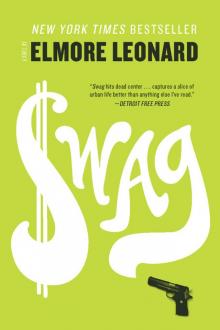 Swag
Swag Road Dogs
Road Dogs La Brava
La Brava The Hot Kid
The Hot Kid Valdez Is Coming: A Novel
Valdez Is Coming: A Novel Be Cool
Be Cool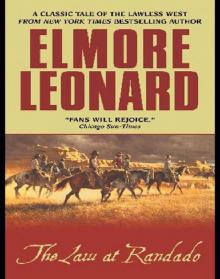 The Law at Randado
The Law at Randado The Bounty Hunters
The Bounty Hunters When the Women Come Out to Dance
When the Women Come Out to Dance 310 to Yuma and Other Stories (1953)
310 to Yuma and Other Stories (1953)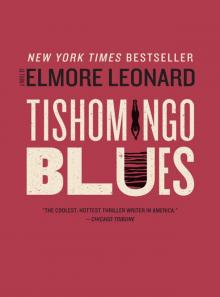 Tishomingo Blues
Tishomingo Blues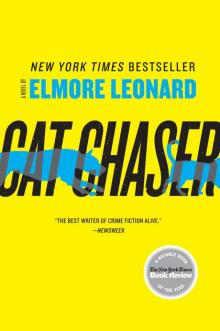 Cat Chaser
Cat Chaser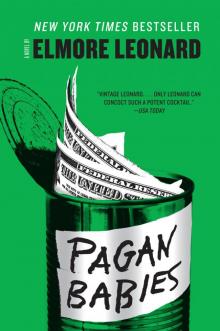 Pagan Babies
Pagan Babies Elmore Leonard's Western Roundup #1
Elmore Leonard's Western Roundup #1 52 Pickup
52 Pickup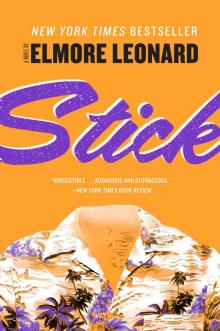 Stick
Stick The Moonshine War
The Moonshine War Valdez Is Coming
Valdez Is Coming City Primeval
City Primeval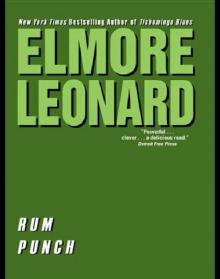 Rum Punch
Rum Punch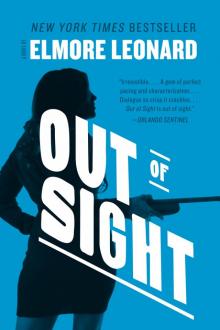 Out of Sight
Out of Sight Naked Came the Manatee (1996)
Naked Came the Manatee (1996) Killshot
Killshot Cuba Libre
Cuba Libre Forty Lashes Less One
Forty Lashes Less One The Complete Western Stories of Elmore Leonard
The Complete Western Stories of Elmore Leonard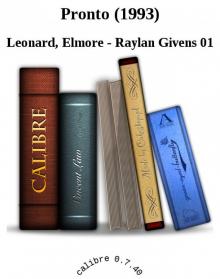 Pronto
Pronto Split Images
Split Images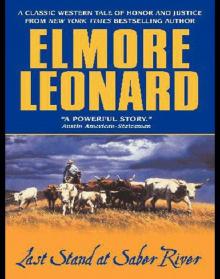 Last Stand at Saber River
Last Stand at Saber River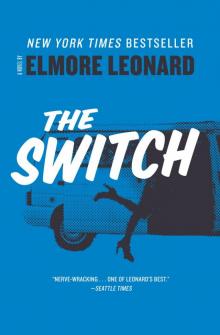 The Switch
The Switch Three-Ten to Yuma and Other Stories
Three-Ten to Yuma and Other Stories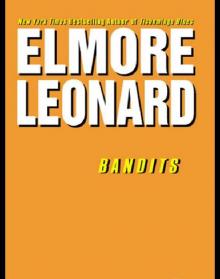 Bandits
Bandits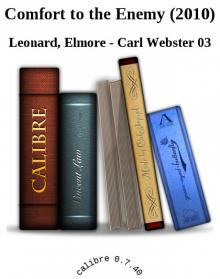 Comfort to the Enemy and Other Carl Webster Stories
Comfort to the Enemy and Other Carl Webster Stories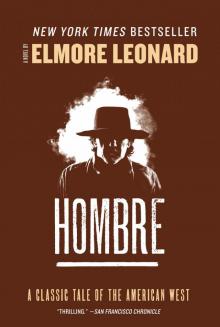 Hombre
Hombre Trail of the Apache and Other Stories
Trail of the Apache and Other Stories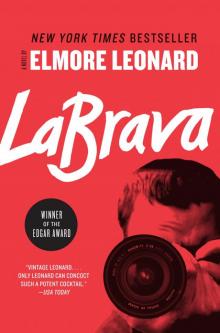 LaBrava
LaBrava Gold Coast
Gold Coast Jackie Brown
Jackie Brown Escape From Five Shadows
Escape From Five Shadows Karen Makes out (1996)
Karen Makes out (1996)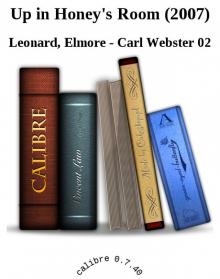 Up in Honey's Room
Up in Honey's Room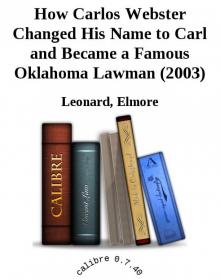 How Carlos Webster Changed His Name to Carl and Became a Famous Oklahoma Lawman (2003)
How Carlos Webster Changed His Name to Carl and Became a Famous Oklahoma Lawman (2003)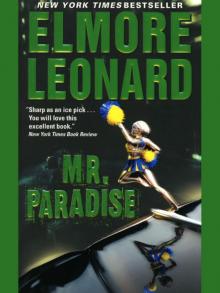 Mr. Paradise
Mr. Paradise The Hunted
The Hunted Freaky Deaky
Freaky Deaky Louly and Pretty Boy (Ss)
Louly and Pretty Boy (Ss)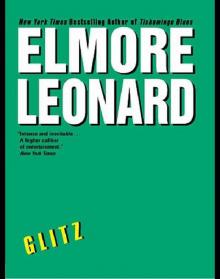 Glitz
Glitz A Coyote's in the House
A Coyote's in the House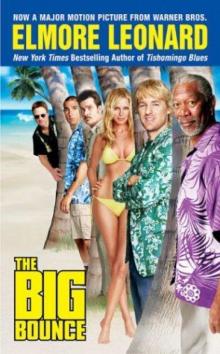 The Big Bounce jr-1
The Big Bounce jr-1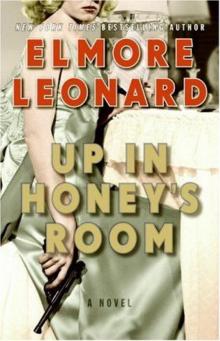 Up in Honey's Room cw-2
Up in Honey's Room cw-2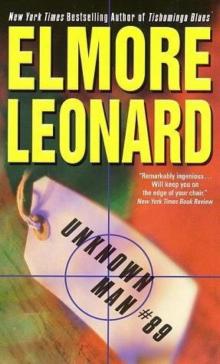 Unknown Man #89 jr-3
Unknown Man #89 jr-3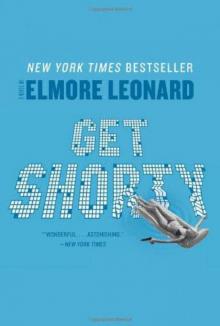 Get Shorty: A Novel cp-1
Get Shorty: A Novel cp-1 Gunsights
Gunsights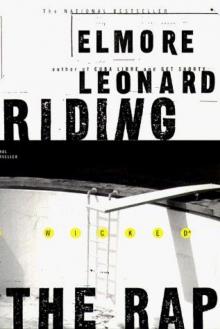 Riding the Rap rg-2
Riding the Rap rg-2